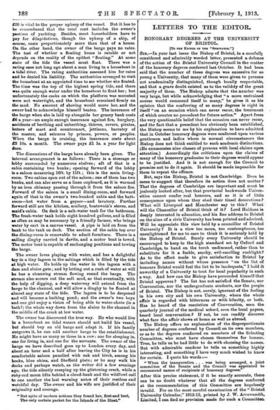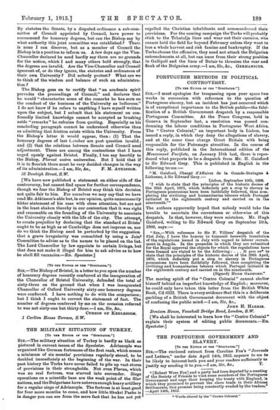LETTERS TO THE EDITOR.
HONORARY DEGREES AT THE UNIVERSITY OF BRISTOL.
[To THE EDITOR Or THII "srsereres."1 Sin,—In your last issue the Bishop of Bristol, in a carefull3 considered and admirably worded letter, presented a defence of the action of the Bristol University Council in the matter of the honorary degrees conferred last October. It had been said that the number of these degrees was excessive for so young a University, that many of them were given to persons not academically distinguished, though locally respectable, and that a grave doubt existed as to the validity of the great majority of them. The Bishop admits that the number was very large, but while acknowledging that " a more restrained course would commend itself to many," he gives it as his opinion that the conferring of so many degrees is right in itself "on an occasion which can never recur, the treatment of which creates no precedent for future action." Apart from the very questionable belief that the occasion can never recur, and the fact that a precedent has obviously been established, the Bishop seems to me by his explanation to have admitted that in October honorary degrees were conferred upon various gentlemen and ladies whom in normal circumstances the Bishop does not think entitled to such academic distinctions. (He enumerates nine classes of persons with local claims upon attention.) Accordingly the criticisms upon the claims of many of the honorary graduates to their degrees would appear to be justified. And it is not enough for the Council to promise not to do it again. It should be made impossible for them to repeat the offence.
But, says the Bishop, Bristol is not Cambridge. Does be mean to suggest that therefore its action does not matter ? That the degrees of Cambridge are important and must be jealously looked after, but that provincial backwoods Univer- sities cannot confer real honours, and so it is of little consequence upon whom they shed their tinsel decorations ? What will Liverpool and Manchester say to this ? What will the Chancellor of Bristol think of it ? Lord Haldane is deeply interested in education, and his fine address to Bristol on the aims of a civic University has been printed and admired. Will be appreciate this view held by a councillor of Bristol University P It is a view too mean, too contemptuous, too unenlightened for me to care to think it is seriously held by the Bishop of Bristol. Surely every University should be encouraged to keep to the high standard set by Oxford and Cambridge, to hand on the torch undimmed, rather than to substitute for it a feeble, smoky, evil-smelling rushlight ? As to the effort made to give satisfaction to Bristol by including names without whose presence " on the list of honours Bristol would feel the list to be inadequate," I hold it unworthy of a University to tout for local popularity in such a way. And how can the Bishop have persuaded himself that Bristol approves P The list has not satisfied the Senate, nor Convocation, nor the undergraduate students, nor the people of Bristol. The Bishop is not, surely, ignorant of the feeling in his own city and his own University, where the whole affair is regarded with bitterness or with hilarity, or both. Has he heard of the resolution of Convocation, seen the quarterly journal of the medical school, seen the local papers, heard local conversation P If not, he can readily discover what face the affair shows at home as well as abroad.
The Bishop offers no explanation of the disproportionate number of degrees conferred by Council on its own members, or as to the degrees conferred on members of the Selecting Committee, who must have chosen themselves for honour. True, be tells us he had little to do with choosing the names. But with admirable candour he tells us something highly interesting, and something I have very much wished to know for certain. I quote his words :-
" When the inauguration . . . was being arranged, a joint committee of the Senate and the Council was appointed to recommend names of recipients of honorary degrees."
After this precise statement, if it be exactly accurate, there can be no doubt whatever that all the degrees conferred at the recommendation of this Committee are hopelessly invalid. For on the most careful examination of the " Bristol University Calendar," 1912-13, printed by J. W. Arrowsmith, Limited, I can find no provision made for such a Committee.
By statutes the Senate, by a disputed ordinance a sub-com- mittee of Council appointed by Council, have power to recommend for honorary degrees, but can the Bishop say by what authority this joint committee was established ? There is none I can discover, but as a member of Council the Bishop is in a position to inform us. A few days ago the Vice- Chancellor declared he need hardly say there are no grounds for the notion, which I and many others hold strongly, that the degrees are invalid. Are the Vice-Chancellor and Council ignorant of, or do they ignore, the statutes and ordinances of their own University P Did nobody protest P What are we to think of the wisdom and balance of such an administra- tion P The Bishop goes on to certify that "an academia spirit pervades the proceedings of Council," and declares that lie would "characterize some of the remarks he has seen on the conduct of the business of the University as ludicrous." I do not know if he refers to anything I have myself written upon the subject, but I submit that his statement on con- fessedly limited knowledge cannot be accepted as brushing aside "remarks" he refrains from quoting. Especially as his concluding paragraph cannot be understood otherwise than as admitting that friction exists within the University. From the Bishop's letter it would appear, then : (1) That the honorary degrees of last Cctoher are past question invalid ; and (2) that the relations between Senate and Council need adjustment. These are among the contentions that I have urged openly against Bristol. Finally, I too say heartily to the Bishop, Floreat vestra universitas. But I hold that if it is to flourish there must be very decided changes in the way
[We have now published a statement on either side of the controversy, but cannot find space for further correspondence, though we fear the Bishop of Bristol may think this decision not quite fair to him. For ourselves we may say that we have read Mr. Atkinson's able but, in our opinion. quite unnecessarily bitter statement of his case with close attention, but are not in the least shaken thereby in our contention that it was right and reasonable on the founding of the University to associate the University closely with the life of the city. The attempti to create prejudice by declaring that the standard at Bristo ought to be as high as at Cambridge does not impress us, nor do we think the Bishop need be perturbed by the suggestion that a grave irregularity was committed by using a Joint Committee to advise as to the names to be placed on the list. The Lord Chancellor by law appoints to certain livings, but that does not make it illegal for him to ask advice as to how he shall fill vacancies.—En. Spectator.]











































 Previous page
Previous page